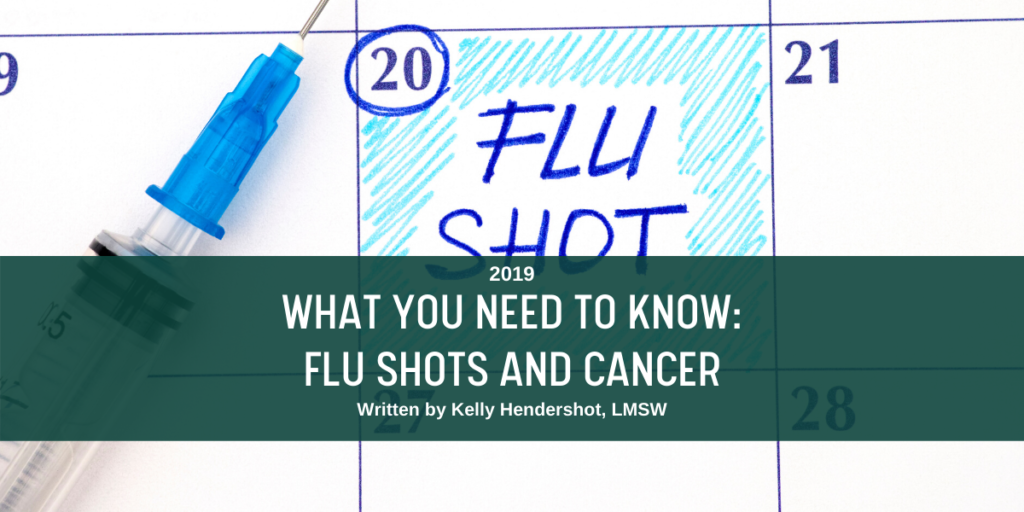Flu Shots & Cancer

By: Kelly Hendershot
The Centers for Disease Control and Prevention (CDC) recommends everyone age 6 months and older should get a flu shot every season. It’s further advised flu shots should be received at the start of the flu season, typically in October. However, maybe you’re a cancer patient/survivor and heard conflicting information regarding if a flu shot is the smart choice for you and delayed. No problem. November has just begun, so there’s still time to schedule your flu shot after reading this article and having your mind put at ease. *Please note: The following is general information. It is always recommended to consult with your own medical team to make sure there is no reason in your specific situation not to receive a flu shot.
Can active cancer patients receive the flu shot?
The short answer is yes*.
Cancer patient undergoing treatment such as chemotherapy and/or radiation are often encouraged to get a flu shot because they’re already at risk for a compromised immune system.
According to the CDC, “the flu shot has a long, established safety record in people with cancer.”
The effects of immunotherapy patients and flu shots are still being studied. Until there is more research on this area, it is recommended immunotherapy patients consult with their oncologist before receiving any type of flu vaccination.
According to the American Cancer Society (ACS), “People with cancer or a history of cancer are more likely to have serious problems if they get the flu, as are pregnant women, young children, people over 65, and those with lung disease, heart disease, diabetes, and other medical problems.”
It is important to note there are two types of flu vaccines. ACS further cautions cancer patients/survivors should avoid the nasal spray vaccine and receive the shot:
- Live vaccines are made of weakened live virus and given as a nasal spray – people with cancer should NOT get the nasal spray vaccine.
- Inactivated vaccines are made of dead virus. They are given as a shot.
Even in its weakened form, live vaccines could cause serious illness in a person whose immune system is already weakened from treatment.
What about me? As a cancer survivor should I get a flu shot?
Yes*, you too. Both cancer patients and survivors should follow the same guidelines as everyone else and receive the flu shot each season.
Each year, the flu shot vaccine is updated to protect against new strains flu virus. Flu vaccinations also wear off over time. This is why it’s recommended to get the flu shot annually. Getting a flu shot early in the seasons (typically lasting from October to May) is also recommended because it can take the body up to two weeks, after receiving the flu shot, for your body build up antibodies protecting you against the flu.
Caregivers
According to the CDC, “People with flu can spread it to others up to about six feet away.” Therefore, anyone 6 months or older living with or caring for someone with cancer is strongly advised to receive the annual flu vaccination. The CDC strengthens their argument that caregivers should be vaccinated by stating “most healthy adults may be able to infect others beginning the day before symptoms develop and five to seven days after becoming sick.”
Additional Precautions
In addition to receive to receive the flu shot, ACS provides the following tips to protect yourself from getting the flu:
- Wash your hands often. Use soap and warm water or alcohol-based cleaners or wipes.
- Do not touch your eyes or nose. Keep your fingers away from your mouth.
- Cover your mouth and nose with a tissue when you cough or sneeze. Then throw the tissue in the trash and wash your hands.
- Try to stay away from sick people. At least 6 feet is thought to be a safe distance (except for chickenpox and tuberculosis [TB], which can travel on air currents).
- Try to stay away from small children who spend their days in group settings like day care or school – germs spread easily in these places.
- Be ready just in case you do get sick so you can stay home. Have things you might need at home (food, tissues, hand cleaners, medicines for cough and fever, and so on) so you won’t have to go out to get them.
- Take care of yourself. Follow public health advice about outbreaks, like school closings and avoiding crowds.
- If you do get sick, stay home for at least 24 hours after your fever is gone without the use of a fever-relief medicine.
Sources: CDC.gov, Cancer.org
